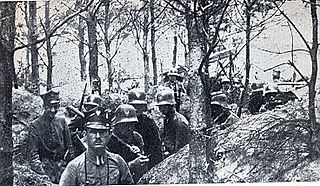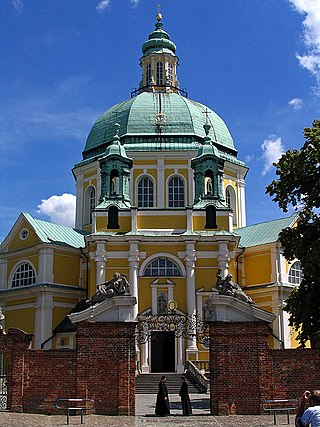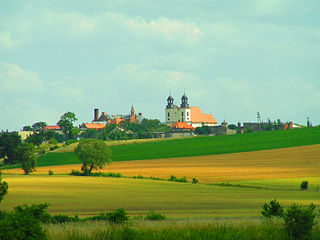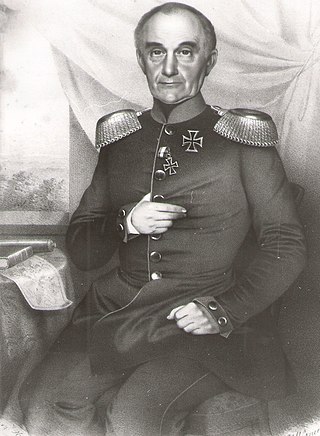
The Grand Duchy of Posen was part of the Kingdom of Prussia, created from territories annexed by Prussia after the Partitions of Poland, and formally established following the Napoleonic Wars in 1815. Per agreements derived at the Congress of Vienna it was to have some autonomy. However, in reality it was subordinated to Prussia and the proclaimed rights for Polish subjects were not fully implemented. On 9 February 1849, the Prussian administration renamed the grand duchy the Province of Posen. Its former name was unofficially used afterward for denoting the territory, especially by Poles, and today is used by modern historians to refer to different political entities until 1918. Its capital was Posen.

The Greater Poland uprising of 1918–1919, or Wielkopolska uprising of 1918–1919 or Posnanian War was a military insurrection of Poles in the Greater Poland region against German rule. The uprising had a significant effect on the Treaty of Versailles, which granted a reconstituted Second Polish Republic the area won by the Polish insurrectionists. The region had been part of the Kingdom of Poland and then Polish–Lithuanian Commonwealth before the 1793 Second Partition of Poland when it was annexed by the German Kingdom of Prussia. It had also, following the 1806 Greater Poland uprising, been part of the Duchy of Warsaw (1807–1815), a French client state during the Napoleonic Wars.

Jarocin is a town in west-central Poland with 25,700 inhabitants (1995), the administrative capital of Jarocin County in Greater Poland Voivodeship.

Gostyń is a town in western Poland, seat of the Gostyń County and Gmina Gostyń in the Greater Poland Voivodeship. According to 31 December 2023 data its population was 27,846.

The Frontier March of Posen–West Prussia was a province of Prussia from 1920/1922 to 1938, covering most of lands of historical Greater Poland that were not included in the Second Polish Republic. Posen–West Prussia was established in 1922 as a province of the Free State of Prussia within Weimar Germany, formed from merging three remaining non-contiguous territories of Posen and West Prussia, which had lost the majority of their territory to the Second Polish Republic following the Greater Poland Uprising. From 1934, Posen–West Prussia was de facto ruled by Brandenburg until it was dissolved by Nazi Germany, effective 1 October 1938 and its territory divided between the provinces of Pomerania, Brandenburg and Silesia. Schneidemühl was the provincial capital. Today, lands of the province are entirely contained within Poland.

South Prussia was a province of the Kingdom of Prussia from 1793 to 1807 created out of territory annexed in the Second Partition of Poland.

Prince Antoni Henryk Radziwiłł was a Polish and Prussian noble, aristocrat, musician, and politician. Initially a hereditary Duke of Nieśwież and Ołyka, as a scion of the Radziwiłł family he also held the honorific title of a Reichsfürst of the Holy Roman Empire. Between 1815 and 1831 he acted as Duke-Governor of the Grand Duchy of Posen, an autonomous province of the Kingdom of Prussia created out of Greater Polish lands annexed in the Partitions of Poland.

The Province of Posen was a province of the Kingdom of Prussia from 1848 to 1920, occupying most of the historical Greater Poland. The province was established following the Poznań Uprising of 1848 as a successor to the Grand Duchy of Posen, which in turn was annexed by Prussia in 1815 from Duchy of Warsaw. It became part of the German Empire in 1871. After World War I, Posen was briefly part of the Free State of Prussia within Weimar Germany, but was dissolved in 1920 when the Greater Poland Uprising broke out and most of its territory was incorporated into the Second Polish Republic. The remaining German territory was re-organized into Posen-West Prussia in 1922.

Łabiszyn is a small town in Żnin County, in the Kuyavian-Pomeranian Voivodeship in Poland, with 4,452 inhabitants (2010). It is located on the Noteć river near Żnin, on the border between the historic regions of Pałuki and Kuyavia.

The Greater Poland uprising of 1848 or Poznań Uprising was an unsuccessful military insurrection of Poles against forces of the Kingdom of Prussia, during the Revolutions of 1848. The main fighting in the Prussian Partition of Poland was concentrated in the Greater Poland region but some fighting also occurred in Pomerelia. In addition, protests were also held in Polish inhabited regions of Silesia.

Margonin is a town in Chodzież County, Greater Poland Voivodeship, Poland, with 3,022 inhabitants (2016).

Vormärz was a period in the history of Germany preceding the 1848 March Revolution in the states of the German Confederation. The beginning of the period is less well-defined. Some place the starting point directly after the fall of Napoleon and the establishment of the German Confederation in 1815. Others, typically those who emphasise the Vormärz as a period of political uprising, place the beginning at the French July Revolution of 1830.

Kcynia is a town in Nakło County, Kuyavian-Pomeranian Voivodeship, in north-central Poland, with 4,702 inhabitants (2010). It is located in the Pałuki ethnographic region in the northern part of historic Greater Poland.

Ludwik Adam Mierosławski was a Polish general, writer, poet, historian and political activist. Mierosławski took part in the November Uprising of the 1830s, and after its failure he emigrated to France, where he taught Slavic history and military theory. Chosen as a commander for the Greater Poland Uprising of 1846, he was taken prisoner early but amnestied during the Spring of Nations. In 1848 and 1849 he fought for the insurgents in Baden and in the Electorate of the Palatinate. Afterwards he returned to France; he also had contacts with Italian activists like Giuseppe Garibaldi. He also took part in the January Uprising in the 1860s, as the first of four dictators of the Uprising.

The Prussian Partition, or Prussian Poland, is the former territories of the Polish–Lithuanian Commonwealth acquired during the Partitions of Poland, in the late 18th century by the Kingdom of Prussia. The Prussian acquisition amounted to 141,400 km2 of land constituting formerly western territory of the Commonwealth. The first partitioning led by imperial Russia with Prussian participation took place in 1772; the second in 1793, and the third in 1795, resulting in Poland's elimination as a state for the next 123 years.

Karl Wilhelm Freiherr von Willisen was a Prussian general.

The Germanisation of the Province of Posen was a policy of the Kulturkampf measures enacted by German Chancellor Otto von Bismarck, whose goal was to Germanize Polish-speaking areas in the Prussian Province of Posen by eradicating and discrimination of Polish language and culture, as well as to reduce the influence of the "ultramontanist" Roman Catholic clergy in those regions.

The Battle of Miloslaw, which was the largest battle of the Greater Poland Uprising (1848), took place on April 30, 1848, near the town of Miloslaw, which at that time belonged to the Grand Duchy of Posen, Kingdom of Prussia. Polish rebel forces under Ludwik Mieroslawski clashed with Prussian Army unit of General Blumen. Enjoying numerical superiority, the Poles won the battle.
Political prisoners in Poland and Polish territories have existed throughout much of the 19th and 20th centuries. In the 19th century, some Polish political prisoners started using their situation of imprisonment to act politically. This phenomenon became visible as early as in the aftermath of the Greater Poland Uprising of 1848.

Teofil Magdziński was a Polish lawyer, conspirator and activist in exile. He participated in several Polish uprisings of the second half of the 19th century. He was one of the most prominent politicians in Bydgoszcz, representative at the Reichstag and a staunch defender of Polishness.






















